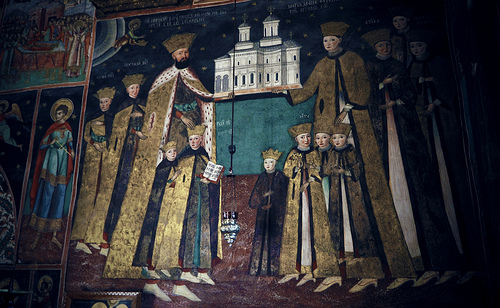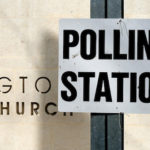We run our website the way we wished the whole internet worked: we provide high quality original content with no ads. We are funded solely by your direct support. Please consider supporting this project.

The Problem with Mixing Church & Government
Image by fusion-of-horizons via Flickr
Some people insist that the only reason that neither Jesus nor anyone else in the first several centuries of the church tried to dominate the political system of their day was because they were a small minority of people living in a nondemocratic and hostile environment. By contrast, the argument goes, American Christians are a sizable group living in a rather friendly, democratic land, and we are able to at least improve, if not someday dominate, our government and culture. And since to whom much is given much is required (Lk 12:48), do we not have a spiritual and moral obligation to use this opportunity to the full advantage of the kingdom of God? In this light, the argument concludes, to shirk the opportunity to rule because we are afraid of compromising our kingdom calling is irresponsible, pharisaical, and cowardly. The argument seems to make so much sense.
The church during the time of Constantine explained away the self-sacrificial love and humility of Jesus and the early church in just this fashion. Instead of constituting the essence of the kingdom of God, the self-sacrificial and humble example of Jesus and the early church was understood to be merely a provisional inconvenience. Now that God had supposedly given the church power to rule, they reasoned, it just made sense to use it. For they, being the people who knew the truth, obviously knew best how to rule others.
Yet what did this line of reasoning accomplish? It produced centuries of barbaric bloodshed—in Jesus’ name. Beyond the tragedy of millions of people being brutally murdered, the fact that this was done under the banner of the cross has harmed global missions for centuries. And the church lost its power along the way.
Whenever Christians have gotten what so many American evangelicals today are trying to get—namely, the power to enforce their righteous will on others—it eventually harms the church as well as the culture. The lesson of history, a lesson the Devil has known all along, is this: The best way to defeat the kingdom of God is to empower the church to rule the kingdom of the world—for then it becomes the kingdom of the world! The best way to get people to lay down the cross is to hand them the sword!
The kingdom of God is not about coercive “power over,” but influential “power under.” Its essence is found in the power to transform lives from the inside out through love and service.
When kingdom-of-God citizens aspire to acquire Caesar’s authority to accomplish “the good,” we sell our kingdom birthright for a bowl of worldly porridge (Gen 25). To the extent that we pick up the sword, we put down the cross. When our goal as kingdom people becomes centered on effectively running a better version of the kingdom of the world, we compromise our calling to be faithful to the kingdom of God.
—Adapted from The Myth of a Christian Nation, pages 93-95.
Category: General
Tags: Church, Constantine, Government, Myth of a Christian Nation, Politics, Power
Topics: Ethical, Cultural and Political Issues
Related Reading

Jesus and Democracy
Question: I’ve heard that the reason Jesus didn’t speak up on political issues was because he didn’t have the benefit of living in a democracy. Since we do, don’t we have a duty both to God and our country to be involved in politics? Answer: If the reason Jesus didn’t speak up on political issues…

Why do you argue that discipleship and politics are rooted in opposite attitudes?
Question. At a recent conference I heard you argue against the idea that there could ever be a distinctly “Christian” political position by contending that political disputes are premised on a claim to superiority while discipleship is fundamentally rooted in humility. I don’t think I get what you mean. Can you explain this? Answer: In…

Are you a pietist?
Question: Soon after the publication of your book The Myth of a Christian Nation, I heard Chuck Colson charge you with being a “pietist.” Since then, others have repeated the charge. They all claim you advocate a Gospel that focuses on individual salvation but leaves social issues for government to address. Are you a pietist?…

What About the Arizona Anti-Gay Bill?
HumanSeeHumanDo via Compfight The recent anti-gay bill in Arizona which was passed last week by the state’s Legislature and now sits on the desk of the Governor, would allow companies to deny service to or discriminate against gay people based on the religious beliefs of the business owner. In response, Greg has tweeted: “The governor…

Podcast: How Do We Balance Both Seeking Unity While Also Confronting Error?
Greg looks at the call to unity and considers things that do not help achieve it. http://traffic.libsyn.com/askgregboyd/Episode_0421.mp3

